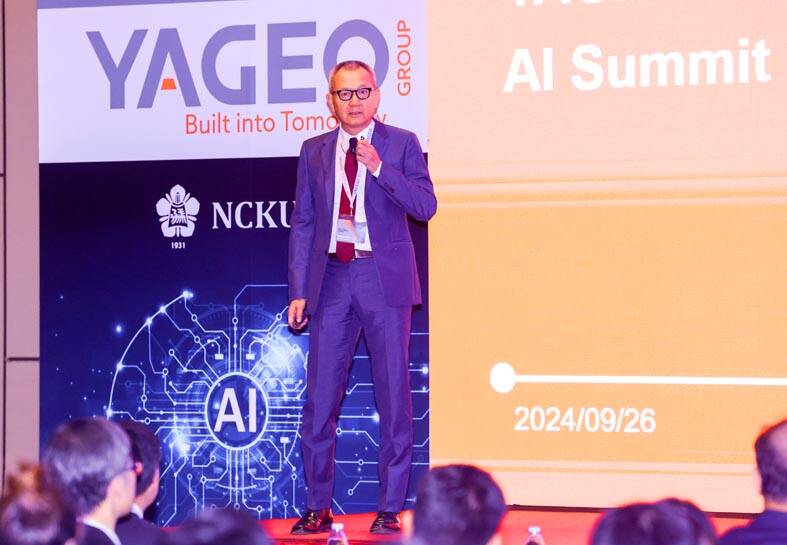Kaimei Electronic Corp (凱美), a supplier of passive components, yesterday said it has allocated a majority of its chip resistor manufacturing capacity to a Malaysian factory from China to brace for potential tariff hikes on Chinese goods from the US.
The company’s remarks came amid investors’ growing concern about escalating trade frictions between China and the US, and how the US’ new trade policies would play out after US president-elect Donald Trump takes office on Jan. 20. Trump has threatened to levy 10 percent more on Chinese imports.
“We have deployed a full production line this year in Malaysia to produce chip resistors. We are evaluating the possibility of using the facility to produce other products to cope with customers’ manufacturing relocations,” Kaimei spokesman Andrew Lee (李彥儒) told a virtual investors’ conference yesterday.

Photo: CNA
“We are providing more flexibility for customers in terms of manufacturing sites, allowing us to have a competitive edge over Chinese rivals,” Lee said.
The new Malaysian factory produces 80 percent of Kaimei’s chip resistors, a surge from 40 percent in the past, Lee said.
Its Chinese factory in Kunshan, Jiangsu Province, used to be the company’s manufacturing hub, making up 60 percent of its total chip resistors. Now, the Chinese factory makes up a mere 20 percent of its total production of chip resistors, he said.
Kaimei is 7.34 percent owned by Yageo Corp (國巨), the world’s third-largest passive component supplier.
For next year, Kaimei holds a cautiously optimistic view about its business outlook, Lee said, adding that factory utilization would improve, from 50 percent for its chip resistor factories and 80 percent for its aluminum electrolytic capacitor and cooling fan factories.
Artificial intelligence (AI) “remains the bright spot next year. Kaimei will not be absent from the market,” Lee said. “The introduction of new artificial intelligence PCs and power supplies for those devices is to stimulate new demand for passive components.”
Kaimei would benefit from the AI uptakes next year as AI devices usually require high-end passive components, which carry higher average selling prices, he said.
The outlook for the current quarter is lackluster, as the prospects for the world economy remain unclear and uncertain before Trump takes office, Kaimei said.
Revenue this quarter would drop slightly from NT$1.38 billion (US$42.4 million) in the third quarter, Lee said.
Chip resistors made up 46 percent of the company’s total revenue during the first three quarters of this year. Aluminum electrolytic capacitors accounted for 44 percent, with the remaining 10 percent of revenue from cooling fans.
China remained the biggest market for the company, making up a sizeable revenue share of 65 percent during the first three quarters, while the US market only constituted 3 percent.
Net profit expanded 14 percent year-on-year to NT$378 million during the first three quarters compared with NT$332 million in the same period last year. Earnings per share rose to NT$3.48 from NT$3.05.
Gross margin improved to about 19 percent during the nine-month period ending September from about 16 percent in the same period last year.

Intel Corp chief executive officer Lip-Bu Tan (陳立武) is expected to meet with Taiwanese suppliers next month in conjunction with the opening of the Computex Taipei trade show, supply chain sources said on Monday. The visit, the first for Tan to Taiwan since assuming his new post last month, would be aimed at enhancing Intel’s ties with suppliers in Taiwan as he attempts to help turn around the struggling US chipmaker, the sources said. Tan is to hold a banquet to celebrate Intel’s 40-year presence in Taiwan before Computex opens on May 20 and invite dozens of Taiwanese suppliers to exchange views

Application-specific integrated circuit designer Faraday Technology Corp (智原) yesterday said that although revenue this quarter would decline 30 percent from last quarter, it retained its full-year forecast of revenue growth of 100 percent. The company attributed the quarterly drop to a slowdown in customers’ production of chips using Faraday’s advanced packaging technology. The company is still confident about its revenue growth this year, given its strong “design-win” — or the projects it won to help customers design their chips, Faraday president Steve Wang (王國雍) told an online earnings conference. “The design-win this year is better than we expected. We believe we will win

Chizuko Kimura has become the first female sushi chef in the world to win a Michelin star, fulfilling a promise she made to her dying husband to continue his legacy. The 54-year-old Japanese chef regained the Michelin star her late husband, Shunei Kimura, won three years ago for their Sushi Shunei restaurant in Paris. For Shunei Kimura, the star was a dream come true. However, the joy was short-lived. He died from cancer just three months later in June 2022. He was 65. The following year, the restaurant in the heart of Montmartre lost its star rating. Chizuko Kimura insisted that the new star is still down

While China’s leaders use their economic and political might to fight US President Donald Trump’s trade war “to the end,” its army of social media soldiers are embarking on a more humorous campaign online. Trump’s tariff blitz has seen Washington and Beijing impose eye-watering duties on imports from the other, fanning a standoff between the economic superpowers that has sparked global recession fears and sent markets into a tailspin. Trump says his policy is a response to years of being “ripped off” by other countries and aims to bring manufacturing to the US, forcing companies to employ US workers. However, China’s online warriors